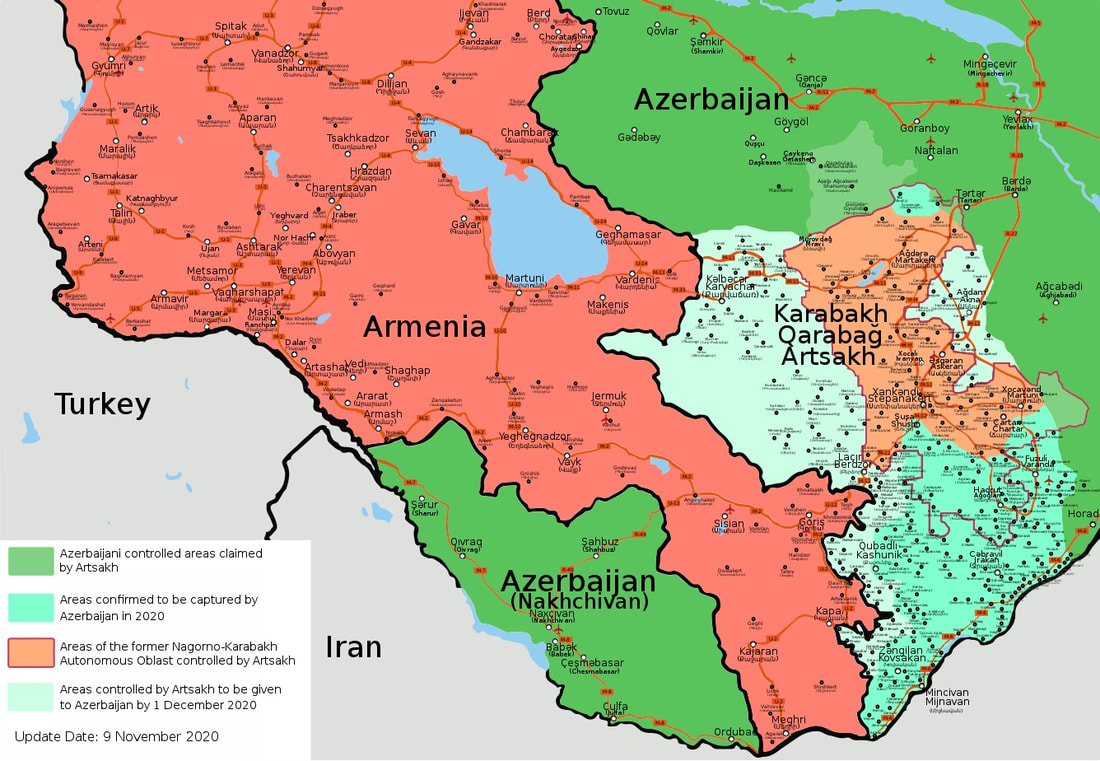|
My blog posts revolve around my interests and vocation as a historian: the intersection of history and contemporary church life, the intersection of history and contemporary politics, serendipitous discoveries in archives or on research trips, publications and research projects, upcoming conferences, and speaking engagements.
I sometimes blog for two other organizations, the Canadian Baptist Historical Society and the Centre for Post-Christendom Studies. The views expressed in these blogs represent the views of the authors, and not necessarily those of any organizations with which they are associated. |
|
Emreculha, CC BY-SA 4.0 <https://creativecommons.org/licenses/by-sa/4.0>, via Wikimedia Commons The recent Armenian-Azerbaijan conflict over the disputed Nagorno-Karabakh region is a reminder of some pressing issues Christians need to consider when shaping informed opinions on two key matters related to warfare: territory and technology. First, the issue of territory.
As I noted in a blog a few months ago, the world is filled with disputed territories. And that observation certainly applies to the Caucasus region. The memory associated with lost land plays a critical role in fuelling motivation for the re-conquest (or defence) of lost territory. In many cases, a spirit of Revanchism (revenge) motivates hatreds and promotes violence, and, as a result, the history of the region has its horror stories. In the case of Azerbaijan, the loss of territory in the violence of the late 1980s and early 1990s led to decades of planning to one day recapture what was lost. As for Armenians, the memory of Turkish genocide of a few generations ago – and the subsequent loss of vast swaths of ancient lands to Turkey – has led to a passionate defence of every inch of soil and a fear of another genocide if they fail to do so. For both nations, territory is at the heart of the present-day violence.[1] For Christians, the issue is who has justice of their side of claims over territory? Simply stated, who owns what? And answering that question requires some diligent historical and legal research, not a quick reading of memes and social media “reports.” Second, the issue of technology. Armenia and its allies in Nagorno-Karabakh were recently quickly routed and faced a humiliating defeat.[2] It was not supposed to be that way, for the land is ideally suited for defence. Yet, within a short time, and much to the surprise of the rest of the world, Azerbaijan was recapturing lost territory. The difference maker was the radically new use of drones in warfare. Drones are not new, as I noted in a recent blog, and their use in warfare raises critical ethical issues related to human control over events on the battlefield as well as the dehumanizing aspects of robotic/computer warfare.[3] But what was new in this conflict was the advanced technology of drones purchased by Azerbaijan from Turkey and Israel.[4] Armenia simply did not have the technology to jam or intercept the coordinated reconnaissance missions and swarming attacks of drones. In other words, their troops were technologically inferior and sitting ducks to attacks from the drones ranging unimpeded over the battlefield. In conclusion, issues related to territory and technology require constant engagement by Christians if they want an informed view on ever-evolving current events. For those concerned with justice, claims of territory will be of special concern. For those concerned with human dignity, the use of technology will be of particular interest. And as for the disputed Nagorno-Karabakh region, what does the future bring? I am not optimistic, for links to the land are powerful. My fear is that the cycle of lose-land, take-it-back, lose-it-again is going to be replayed sometime in the near future, and no doubt joining the next generation of young soldiers on the battlefield will be the next generation of drones. [1] Of course, the hatreds are exacerbated by the fact that Armenia is a Christian nation and Azerbaijan a Muslim nation. Turkey’s membership with NATO and Russia’s alliance with Armenia complicates the conflict even further. [2] The formal territory of Armenia was never attacked by Azerbaijan, only the disputed Nagorno-Karabakh region. No doubt Russia’s military alliance with Armenia played a part in that decision. [3] For a movie that deals thoughtfully with some of the ethical concerns and military constraints around waging drone warfare, see Eye in the Sky(2015). [4] For some helpful commentary on the conflict’s weaponry and tactics, see https://ecfr.eu/article/military-lessons-from-nagorno-karabakh-reason-for-europe-to-worry/
0 Comments
Leave a Reply. |
Archives
May 2024
|

 RSS Feed
RSS Feed
